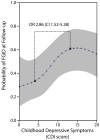Predicting persistence of functional abdominal pain from childhood into young adulthood
- PMID: 24732284
- PMCID: PMC4195814
- DOI: 10.1016/j.cgh.2014.03.034
Predicting persistence of functional abdominal pain from childhood into young adulthood
Abstract
Background & aims: Pediatric functional abdominal pain has been linked to functional gastrointestinal disorders (FGIDs) in adulthood, but little is known about patient characteristics in childhood that increase the risk for FGID in young adulthood. We investigated the contribution of gastrointestinal symptoms, extraintestinal somatic symptoms, and depressive symptoms in pediatric patients with functional abdominal pain and whether these predicted FGIDs later in life.
Methods: In a longitudinal study, consecutive new pediatric patients, diagnosed with functional abdominal pain in a subspecialty clinic, completed a comprehensive baseline evaluation of the severity of their physical and emotional symptoms. They were contacted 5 to 15 years later and evaluated, based on Rome III symptom criteria, for abdominal pain-related FGIDs, including irritable bowel syndrome, functional dyspepsia, functional abdominal pain syndrome, and abdominal migraine. Controlling for age, sex, baseline severity of abdominal pain, and time to follow-up evaluation, multivariable logistic regression was used to evaluate the association of baseline gastrointestinal, extraintestinal somatic, and depressive symptoms in childhood with FGID in adolescence and young adulthood.
Results: Of 392 patients interviewed an average of 9.2 years after their initial evaluation, 41% (n = 162) met symptom criteria for FGID; most met the criteria for irritable bowel syndrome. Extraintestinal somatic and depressive symptoms at the initial pediatric evaluation were significant predictors of FGID later in life, after controlling for initial levels of GI symptoms. Age, sex, and abdominal pain severity at initial presentation were not significant predictors of FGID later in life.
Conclusions: In pediatric patients with functional abdominal pain, assessment of extraintestinal and depressive symptoms may be useful in identifying those at risk for FGID in adolescence and young adulthood.
Keywords: Depression; Functional Gastrointestinal Disorders; Irritable Bowel Syndrome; Prospective; Somatic Symptoms.
Copyright © 2014 AGA Institute. Published by Elsevier Inc. All rights reserved.
Conflict of interest statement
Figures


Comment in
-
Redux: do little bellyachers grow up to become big bellyachers?Clin Gastroenterol Hepatol. 2014 Dec;12(12):2033-6. doi: 10.1016/j.cgh.2014.06.009. Epub 2014 Jun 19. Clin Gastroenterol Hepatol. 2014. PMID: 24951847 No abstract available.
References
-
- Hyams JS, Burke G, Davis PM, et al. Abdominal pain and irritable bowel syndrome in adolescents: a community-based study. J Pediatr. 1996;129:220–6. - PubMed
-
- Chitkara DK, Rawat DJ, Talley NJ. The epidemiology of childhood recurrent abdominal pain in Western countries: a systematic review. Am J Gastroenterol. 2005;100:1868–75. - PubMed
-
- Gieteling MJ, Bierma-Zeinstra SM, Passchier J, et al. Prognosis of chronic or recurrent abdominal pain in children. J Pediatr Gastroenterol Nutr. 2008;47:316–26. - PubMed
-
- Walker LS, Guite JW, Duke M, et al. Recurrent abdominal pain: a potential precursor of irritable bowel syndrome in adolescents and young adults. J Pediatr. 1998;132:1010–5. - PubMed
Publication types
MeSH terms
Grants and funding
LinkOut - more resources
Full Text Sources
Other Literature Sources
Medical
Miscellaneous

